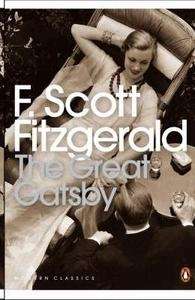The Great Gatsby

Editorial Penguin UK
Fecha de edición febrero 2000
Idioma inglés
Prologuista Tanner, Tony
EAN 9780141182636
240 páginas
Libro
encuadernado en tapa blanda
Resumen del libro
In The Great Gatsby Fitzgerald brilliantly captures both the disillusion of post-war America and the moral failure of a society obsessed with wealth and status. But he does more than render the essence of a particular time and place, for in chronicling Gatsby's tragic pursuit of his dream, Fitzgerald recreates the universal conflict between illusion and reality.
'A classic, perhaps the supreme American novel' John Carey, Sunday Times, 'Books of the Century'
'I've read the best novel ever this year. For beauty, economy and clarity there is no one to surpass F. Scott Fitzgerald in The Great Gatsby. If you haven't read it, do' The Times Metro
There was music from my neighbour's house through the summer nights. In his blue gardens men and girls came and went like moths among the whisperings and the champagne and the stars. At high tide in the afternoon I watched his guests diving from the tower of his raft, or taking the sun on the hot sand of his beach while his two motor-boats slit the waters of the Sound, drawing aquaplanes over cataracts of foam. On week-ends his Rolls-Royce became an omnibus, bearing parties to and from the city between nine in the morning and long past midnight, while his station wagon scampered like a brisk yellow bug to meet all trains. And on Mondays eight servants, including an extra gardener, toiled all day with mops and scrubbing-brushes and hammers and garden-shears, repairing the ravages of the night before.
Every Friday five crates of oranges and lemons arrived from a fruiterer in New York - every Monday these same oranges and lemons left his back door in a pyramid of pulpless halves. There was a machine in the kitchen which could extract the juice of two hundred oranges in half an hour if a little button was pressed two hundred times by a butler's thumb.
At least once a fortnight a corps of caterers came down with several hundred feet of canvas and enough coloured lights to make a Christmas tree of Gatsby's enormous garden. On buffet tables, garnished with glistening hors-d oeuvre, spiced baked hams crowded against salads of harlequin designs and pastry pigs and turkeys bewitched to a dark gold. In the main hall a bar with a real brass rail was set up, and stocked with gins and liquors and with cordials so long forgotten that most of his female guests were too young to know one from another.
By seven o'clock the orchestra has arrived, no thin five-piece affair, but a whole pitful of oboes and trombones and saxophones and viols and coronets and piccolos, and low and high drums. The last swimmers have come in from the beach now and are dressing upstairs; the cars from New York are parked five deep in the drive, and already the halls and salons and verandas are gaudy with primary colours, and hair bobbed in strange new ways, and shawls beyond the dreams of Castile. The bar is in full swing, and floating rounds of cocktails permeate the garden outside, until the air is alive with chatter and laughter, and casual innuendo and introductions forgotten on the spot, and enthusiastic meetings between women who never knew each other's names.
The lights grow brighter as the earth lurches away from the sun, and now the orchestra is playing yellow cocktail music, and the opera of voices pitches a key lighter. Laughter is easier minute by minute, spilled with prodigality, tipped out at a cheerful word. The groups change more swiftly, swell with new arrivals, dissolve and form in the same breath; already there are wanderers, confident girls who weave here and there among the stouter and more stable, become for a sharp, joyous moment the centre of a group, and then, excited with triumph, glide on through the sea-change of faces and voices with colour under the constantly changing light.
Suddenly one of these gypsies, in trembling opal, seizes a cocktail out of the air, dumps it down for courage and, moving her hands like Frisco, dances out alone on the canvas platform. A momentary hush; the orchestra leader varies his rhythm obligingly for her, and there is a burst of chatter as the erroneous news goes around that she is Gilda Gray's understudy from the Follies. The party has begun.
Biografía del autor
Francis Scott Fitzgerald (1896 1940) fue uno de los escritores más influyentes de la literatura estadounidense del siglo XX. Formado en Princeton, orientó su vida hacia la creación literaria tras un breve período en el ejército durante la Primera Guerra Mundial. Con A este lado del paraíso (1920) inició una carrera fulgurante que lo convirtió en el principal cronista de la Era del jazz . Autor de obras emblemáticas como El gran Gatsby, Hermosos y malditos y Suave es la noche, exploró con extraordinaria lucidez las tensiones entre deseo, clase social y desengaño en la modernidad norteamericana. Su estilo preciso y elegante, unido a una sensibilidad única para captar el espíritu de su tiempo, lo ha consagrado como una figura central en el canon literario contemporáneo.








